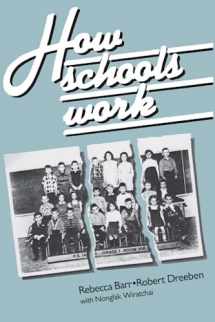
How Schools Work
Book details
Summary
Description
As budgets tighten for school districts, a sound understanding of just how teaching and administration translate into student learning becomes increasingly important. Rebecca Barr, a researcher of classroom instruction and reading skill development, and Robert Dreeben, a sociologist of education who analyzes the structure of organizations, combine their expertise to explore the social organization of schools and classrooms, the division of labor, and the allocation of key resources.
Viewing schools as part of a social organization with a hierarchy of levels—district, school, classroom, instructional group, and students—avoids the common pitfalls of lumping together any and all possible influences on student learning without regard to the actual processes of the classroom. Barr and Dreeben systematically explain how instructional groups originate, form, and change over time. Focusing on first grade reading instruction, their study shows that individual reading aptitude actually has little direct relation to group reading achievement and virtually none to the coverage of reading materials once the mean aptitude of groups is taken into consideration. Individual aptitude, they argue, is rather the basis on which teachers form reading groups that are given different instructional treatment. It is these differences in group treatment, they contend, that explain substantial differences in learning curricular material.


We would LOVE it if you could help us and other readers by reviewing the book
Book review



